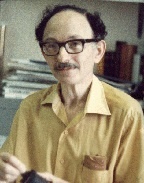In 1965 an article was published in the New Scientist called Logic of Man and Machine written by a British mathematician, Irving John Good, responding to the commonly held view that a machine could never be as intelligent as a human. Born 100 years ago tomorrow, on 9 December 1916, Jack Good, as he was known, argued that humans have limitations in intelligence and that ultimately a machine could be constructed that would match or even exceed a human’s capability.
His 1965 paper, Speculations Concerning the First Ultra-Intelligent Machine, is even more relevant to people interested today in machine intelligence.
Good fundamentally believed that computers and their ultra-intelligent machine successors would deliver a benefit to humanity. The opening line of this seminal paper reads:
“The survival of man depends on the early construction of an ultra- intelligent machine.”
In it, he also originated the idea of an “intelligence explosion”:
“Let an ultra-intelligent machine be defined as a machine that can far surpass all the intellectual activities of any man however clever. Since the design of machines is one of these intellectual activities, an ultra-intelligent machine could design even better machines; there would then unquestionably be an 'intelligence explosion,' and the intelligence of man would be left far behind. Thus the first ultra-intelligent machine is the last invention that man need ever make, provided that the machine is docile enough to tell us how to keep it under control.”
Good wasn’t just making futuristic predictions. Nearly 70 years ago , while at Manchester University and then later while a Fellow at Trinity College, Oxford, he set out the need for complex neural networks as the way to build intelligent machines, a technology that we are only just starting to exploit today. He predicted the need for ultra-parallel machines with highly parallel sparse connections to build intelligent machines.
His comments on reinforcement learning as the best way to train an intelligent machine are prescient but he also describes the concept of small changes in the intelligence structure driven by feedback from the outputs which is effectively what we do today with back propagation in deep neural networks.
Jack Good was well placed to make these arguments. As a renowned mathematician he had worked at Bletchley Park in the UK during the Second World War, alongside Alan Turing and came up with key breakthroughs that allowed the Enigma machine cyphers to be broken. He subsequently worked with Max Newman and Tommy Flowers on the world’s very first electronic computer – Colossus. This huge project was brought online just in time to support the D-Day landings and allowed the Allies to read the most complex cyphers used by the Axis forces. After the war he joined Max Newman and Alan Turing at Manchester University. This star team worked together to develop the Manchester Mark.1 – the world’s first stored program computer.
He is famous as a mathematician for publishing in 1958 a work on an early version of what became known as Fast Fourier Transforms. FFT’s are now at the heart of all modern wired and wireless high speed communications systems. So here is a man who’s breakthroughs helped to create programmable computers, the internet communications system and mobile data devices.
I am definitely not the first to recognize his brilliance. Stanley Kubrick turned to Jack Good as the advisor on the 1968 film 2001: A Space Odyssey. It was Jack Good, with his insights on intelligent machines, that helped to create the in-famous character of HAL, the AI computer who was a central feature in the movie.
Having declared Oxford “a little stiff”, Jack Good moved to the United States in 1967 and took up a position as Research Professor in Statistics at Virginia Polytechnic Institute and State University. Here he focused on his main areas of interest – Bayesian Statistics and Probability Theory. His Virginia car license plate read 007 IJG, a nod to his key role in military intelligence during the war.
Jack Good died on 5th April 2009 at the age of 92. Isadore Jacob Gudak, as he was named at birth, must be considered one of the fathers of our modern world. Happy 100th Birthday for tomorrow, Jack.

